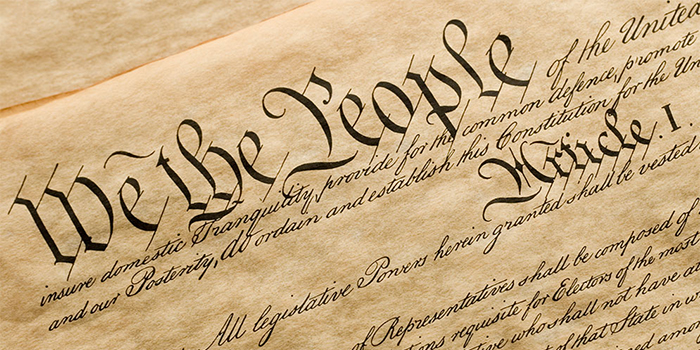The Five Oddest Clauses in the US Constitution
Jay Wexler sheds light on nation’s founding document in BU Today.
 From his revised travel ban, issued Sunday, to his outside business income since taking office, President Trump has been at war with critics who say he’s violating one section or another of the Constitution. If the back and forth has your head spinning, don’t fret: this founding document has parts that even experts find oddball, says Jay Wexler, a School of Law professor and author of The Odd Clauses: Understanding the Constitution Through 10 of Its Most Curious Provisions (Beacon Press, 2012). Here are his top five picks for the most peculiar clauses and his analyses thereof.
From his revised travel ban, issued Sunday, to his outside business income since taking office, President Trump has been at war with critics who say he’s violating one section or another of the Constitution. If the back and forth has your head spinning, don’t fret: this founding document has parts that even experts find oddball, says Jay Wexler, a School of Law professor and author of The Odd Clauses: Understanding the Constitution Through 10 of Its Most Curious Provisions (Beacon Press, 2012). Here are his top five picks for the most peculiar clauses and his analyses thereof.
1. The Two Senators from Each State Clause (Article I, Section 3): The Senate of the United States shall be composed of two Senators from each State.
This provision resulted from a compromise between large and small states at the Constitutional Convention. Large states would get more representation than small ones in the House of Representatives, but all states would get equal representation in the Senate. This means that both California and Rhode Island have the same voting power in the nation’s most important legislative body. If you’ve ever wondered why people all of a sudden feel more politically powerful when they move to Delaware or Wyoming from New York or Texas, this is the reason.
2. The Third Amendment (Amendment III): No Soldier shall, in time of peace be quartered in any house, without the consent of the Owner, nor in time of war, but in a manner to be prescribed by law.
This Amendment was extremely important to the framers, who had witnessed the so-called quartering of British troops during the colonial period, but it has played nearly no role whatsoever in modern American history. It’s hardly surprising that the most cited piece of reporting in the past 200 years about this Amendment was published by The Onion.
3. The Foreign Emoluments Clause (Article I, Section 9): And no Person holding any Office of Profit or Trust under [the United States] shall, without the Consent of the Congress, accept of any present, Emolument, Office, or Title, of any kind whatever, from any King, Prince, or foreign State.
This clause, which was intended by the framers to ensure that federal officers wouldn’t be tempted to give favors to foreign governments in return for money or other goodies, has received unprecedented attention during the early months of the Trump administration. But the clause raises as many questions as it answers. What in the world is an “emolument,” and in particular, if an officer receives fair market value for a service he or she provides a foreign government (like a hotel room), does that mean the officer has violated the Constitution?
